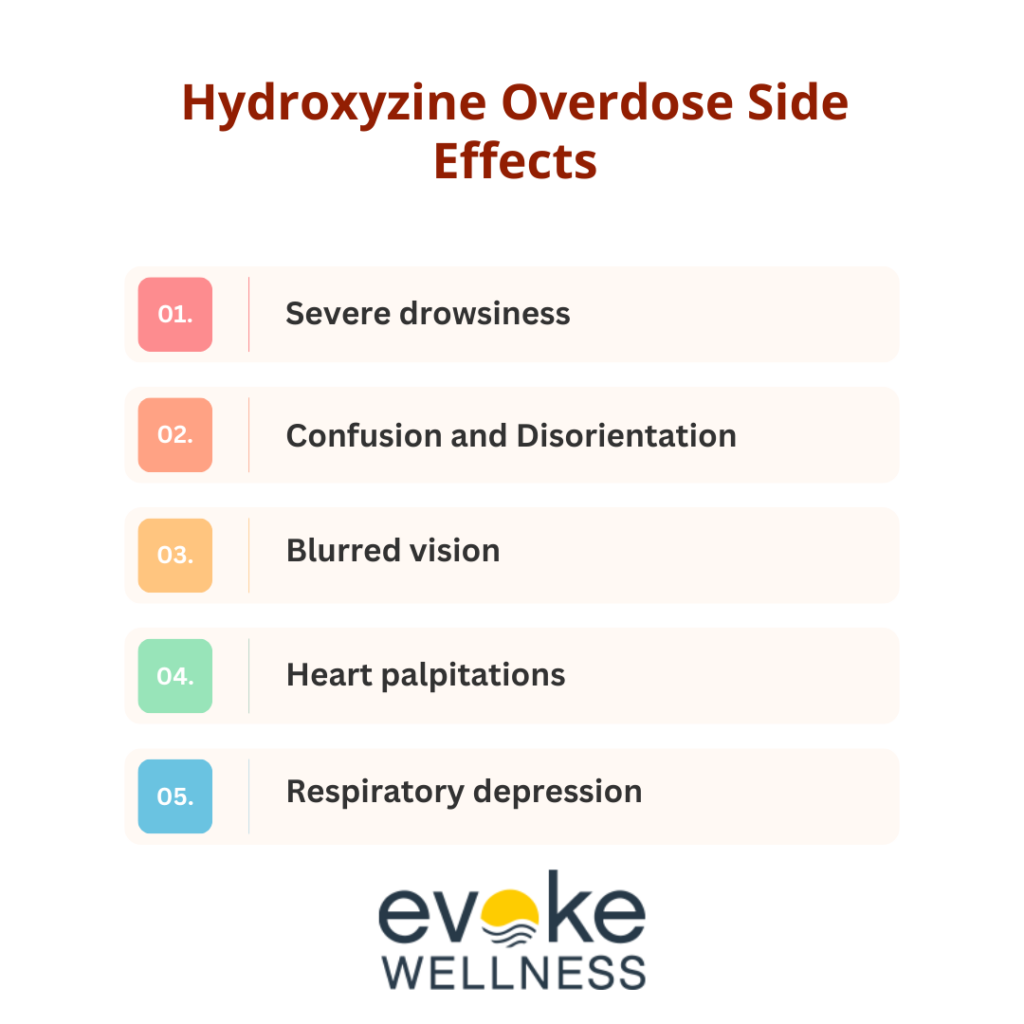Hydroxyzine, an antihistamine, is widely prescribed for treating anxiety, allergies, and other conditions like insomnia and even nausea. It’s often favored because of its calming effects, especially for individuals experiencing anxiety or undergoing withdrawal symptoms. However, like any medication, hydroxyzine should be used cautiously and under medical supervision. While it has a low potential for misuse compared to other medications, it’s still possible to overdose if taken incorrectly. This blog explores the safety profile of hydroxyzine, how it works, proper dosage guidelines, the risks of overdose, and its use in recovery and addiction treatment.
What Is Hydroxyzine and How Does It Work?
Hydroxyzine works by blocking the effects of histamine in the body, which is why it’s often used to treat allergies. However, it also has sedative properties that affect brain chemicals like serotonin and norepinephrine, making it useful for treating anxiety, insomnia, and symptoms related to alcohol withdrawal. It differs from more addictive anti-anxiety medications, such as benzodiazepines, in that it has a much lower risk for abuse or dependency.
Hydroxyzine is often prescribed in substance abuse treatment programs to help manage anxiety without the addiction risks associated with benzodiazepines. Its sedative and calming effects make it a beneficial option for individuals undergoing addiction therapy and recovery, particularly those who struggle with mental health conditions alongside substance use disorders.
Can You Overdose on Hydroxyzine?
Yes, while hydroxyzine is considered relatively safe, overdose is possible, especially if the medication is taken in higher-than-prescribed amounts or combined with other substances like alcohol or sedatives. Hydroxyzine overdoses are rare but can be serious if not addressed promptly. Like any medication, it’s important to follow prescribed doses and guidelines closely.
Symptoms of Hydroxyzine Overdose
Overdosing on hydroxyzine can lead to severe symptoms, including:
- Extreme drowsiness or lethargy: Since hydroxyzine is a sedative, an overdose can cause profound drowsiness and make it difficult to stay awake or alert.
- Severe dry mouth and dehydration: Hydroxyzine can cause dry mouth as a side effect, and an overdose exacerbates this, leading to dehydration and discomfort.
- Blurred vision: Overdose can cause vision problems such as blurred or double vision, which can be dangerous, especially when operating machinery or driving.
- Confusion, agitation, or hallucinations: In some cases, an overdose may affect brain function, leading to confusion, agitation, or even hallucinations, particularly in older adults or those with mental health disorders.
- Low blood pressure: A hydroxyzine overdose can cause a dangerous drop in blood pressure, leading to dizziness, fainting, or shock.
- Respiratory depression: In severe cases, hydroxyzine can depress the central nervous system, leading to slow or labored breathing, especially when combined with alcohol or other sedatives.
If any of these symptoms are observed after taking hydroxyzine, immediate medical attention is crucial, as overdose can be life-threatening.
Hydroxyzine Overdose Side Effects
Hydroxyzine is generally considered safe when taken as prescribed, but an overdose can lead to several adverse side effects. If taken in excessive amounts, hydroxyzine can cause:
- Severe drowsiness: One of the most common symptoms of hydroxyzine overdose, leading to extreme fatigue and lack of coordination.
- Confusion and Disorientation: Individuals may experience mental fog, memory lapses, or an inability to focus.
- Blurred vision: Vision problems such as blurriness may arise due to hydroxyzine’s effects on the central nervous system.
- Dry mouth: Overdosing can intensify hydroxyzine’s usual side effects, leading to excessive dry mouth and difficulty swallowing.
- Heart palpitations: Overdose may cause an abnormal heart rate, including palpitations or a racing heart.
- Low blood pressure: In some cases, an overdose may result in hypotension, leading to dizziness or fainting.
- Respiratory depression: In severe overdose cases, hydroxyzine can suppress breathing, potentially causing life-threatening complications.
Hydroxyzine Toxicity in Humans
Hydroxyzine toxicity occurs when the body is exposed to dangerously high levels of the drug, either through an overdose or in combination with other sedatives like alcohol or benzodiazepines. Hydroxyzine affects the central nervous system (CNS), and at toxic levels, it can cause:
- Extreme CNS depression: Leading to unresponsiveness, coma, or, in rare cases, death.
- Seizures: Though uncommon, large overdoses may trigger seizures due to disrupted electrical activity in the brain.
- Hypoxia: Reduced oxygen supply to the brain and other organs due to respiratory depression can result in permanent organ damage if not treated swiftly.
- Cardiovascular complications: Overdose may result in irregular heartbeats, low blood pressure, or even heart failure in severe cases.
- Loss of consciousness: High toxicity levels can result in unconsciousness, making it critical to seek medical intervention immediately.
What to Do if Someone Overdosed on Hydroxyzine
If someone is suspected of overdosing on hydroxyzine, it’s important to act quickly:
- Call Emergency Services: Contact 911 or your local emergency number immediately if you notice signs of overdose such as unresponsiveness, severe drowsiness, or breathing difficulties.
- Monitor Breathing and Heart Rate: If the person has difficulty breathing or exhibits signs of irregular heartbeats, CPR may be necessary until help arrives.
- Do Not Induce Vomiting: Unless instructed by a medical professional, avoid inducing vomiting as it could complicate the situation.
- Stay with the Person: Keep the individual awake and alert if possible, monitoring their breathing and heart rate closely.
- Provide Medical Information: If available, provide the medical team with details about the amount of hydroxyzine taken, other medications, and any underlying health conditions.
- Hospital Care: Once at the hospital, the person may receive activated charcoal, supportive oxygen, intravenous fluids, and other necessary treatments to stabilize their condition and reduce toxicity.
Safe Dosage Guidelines for Hydroxyzine
For adults, hydroxyzine is usually prescribed in doses of 50 to 100 milligrams per day, split into several smaller doses depending on the condition being treated. The dosage may be lower for elderly patients or those with liver or kidney issues, as they are more prone to complications. For anxiety, doctors often start with a lower dose to assess how the patient reacts before adjusting the amount.
It’s critical to adhere strictly to your healthcare provider’s dosage instructions. Never adjust your dose without consulting a doctor, as this increases the risk of overdose or serious side effects. If you are unsure about the correct dose, ask your healthcare provider or pharmacist for clarification.
The Role of Hydroxyzine in Addiction and Mental Health Treatment
Hydroxyzine plays a significant role in the treatment of co-occurring mental health disorders and substance use disorders, often prescribed as part of a dual diagnosis treatment program. For individuals in recovery from addiction, managing anxiety and insomnia can be particularly challenging. Many turn to substances to cope with these symptoms, increasing the risk of relapse.
In such cases, hydroxyzine is a safer alternative to more addictive medications like benzodiazepines. Its sedative properties help manage anxiety and insomnia without the addictive potential, making it suitable for those in addiction therapy programs. Hydroxyzine is often used alongside treatments like cognitive-behavioral therapy (CBT) and dialectical behavior therapy (DBT), which aim to change unhealthy thinking patterns and coping mechanisms that fuel addiction.
At Evoke Wellness at San Marcos, hydroxyzine is incorporated into a broader treatment plan that addresses the individual’s physical, emotional, and psychological needs. This comprehensive approach includes not only medication management but also therapies designed to help individuals maintain long-term sobriety.
Combining Hydroxyzine with Other Substances: A Dangerous Interaction
One of the most dangerous interactions with hydroxyzine occurs when it is combined with alcohol or other central nervous system depressants. Hydroxyzine and alcohol both have sedative effects, and when taken together, they can significantly increase the risk of respiratory depression, overdose, or even death.
For individuals in recovery, avoiding alcohol while on hydroxyzine is crucial. Alcohol can not only worsen side effects like drowsiness and confusion but also increase the risk of relapse. Alcohol and hydroxyzine affect the central nervous system in similar ways, making it dangerous to use them together.
It’s also important to avoid mixing hydroxyzine with other sedative medications unless prescribed by a healthcare provider. Always discuss any other medications you’re taking with your doctor to ensure there are no harmful interactions.
Hydroxyzine in Recovery Programs
Hydroxyzine is frequently included in recovery programs to help individuals manage anxiety, insomnia, or symptoms of alcohol withdrawal. At Evoke Wellness at San Marcos, we emphasize holistic care, using medications like hydroxyzine alongside a comprehensive recovery plan that includes group therapy programs, family therapy programs, and relapse prevention therapy. Hydroxyzine can help reduce the emotional and psychological triggers that often lead to relapse, making it an effective tool in the recovery process.
Our addiction treatment center in San Marcos, TX, offers personalized care to ensure that each individual’s treatment plan is tailored to their unique needs. This includes assessing whether hydroxyzine is the right medication for their anxiety or mental health treatment needs during addiction treatment.
Conclusion
While hydroxyzine is generally considered safe when used as prescribed, overdose can occur when taken in excess or combined with substances like alcohol. Following dosage guidelines and understanding potential interactions is crucial for maintaining safe use. Hydroxyzine can be an effective medication for individuals managing anxiety and insomnia, especially those in recovery, but its use should always be monitored by healthcare professionals.
At Evoke Wellness at San Marcos, we provide a holistic approach to recovery that integrates safe medication use with evidence-based therapies like CBT and DBT. If you or a loved one is struggling with anxiety or substance use, our addiction treatment center in Texas can provide the support you need for long-term recovery. Reach out to us today to learn more about how hydroxyzine can be safely used as part of a comprehensive treatment plan. Together, let’s embrace the journey to recovery and the promise of a new beginning. Call us at (833) 503-0734 today or reach out online.
FAQs About Can You Overdose on Hydroxyzine?
What is hydroxyzine used for?
Hydroxyzine is commonly prescribed to anxiety treatment, allergies, and insomnia. It also helps manage symptoms related to alcohol withdrawal and is often used in substance abuse treatment programs as a non-addictive anti-anxiety option.
Can you overdose on hydroxyzine?
Yes, though hydroxyzine is generally considered safe when used as directed, overdose is possible if taken in excessive amounts or combined with alcohol or other sedatives. Symptoms of overdose include extreme drowsiness, confusion, blurred vision, and respiratory depression.
What should I do if I suspect an overdose?
If someone exhibits symptoms of a hydroxyzine overdose, such as severe drowsiness, breathing difficulties, or confusion, seek immediate medical attention. Overdose can be life-threatening if not treated promptly.
How can I safely take hydroxyzine?
To ensure safe use, follow your doctor’s prescribed dosage guidelines closely. Never take more than recommended, and avoid combining hydroxyzine with alcohol or other sedative medications unless directed by a healthcare provider.
Is hydroxyzine addictive?
No, hydroxyzine is not considered addictive, making it a safer alternative to other anti-anxiety medications like benzodiazepines. It is often prescribed in addiction treatment programs to manage anxiety without the risk of dependence.
Can I drink alcohol while taking hydroxyzine?
No, mixing hydroxyzine with alcohol can lead to dangerous interactions, including heightened sedation, respiratory depression, and an increased risk of overdose. It’s crucial to avoid alcohol while taking hydroxyzine.
How does hydroxyzine fit into addiction treatment programs?
Hydroxyzine is often used in addiction therapy programs as part of a holistic treatment plan for managing anxiety, insomnia, and withdrawal symptoms. Its non-addictive nature makes it a suitable option for those in recovery from substance abuse.
What is the typical dosage for hydroxyzine?
The typical dosage for adults with anxiety is 50 to 100 mg per day, divided into smaller doses. Dosage may vary based on the condition being treated and the individual’s health profile. Always consult your healthcare provider for personalized dosage instructions.
Is hydroxyzine safe for long-term use?
Hydroxyzine is generally safe for short-term use to manage acute symptoms like anxiety or insomnia. Long-term use should be monitored by a healthcare provider to avoid potential side effects and ensure it remains effective in treating the intended condition.



